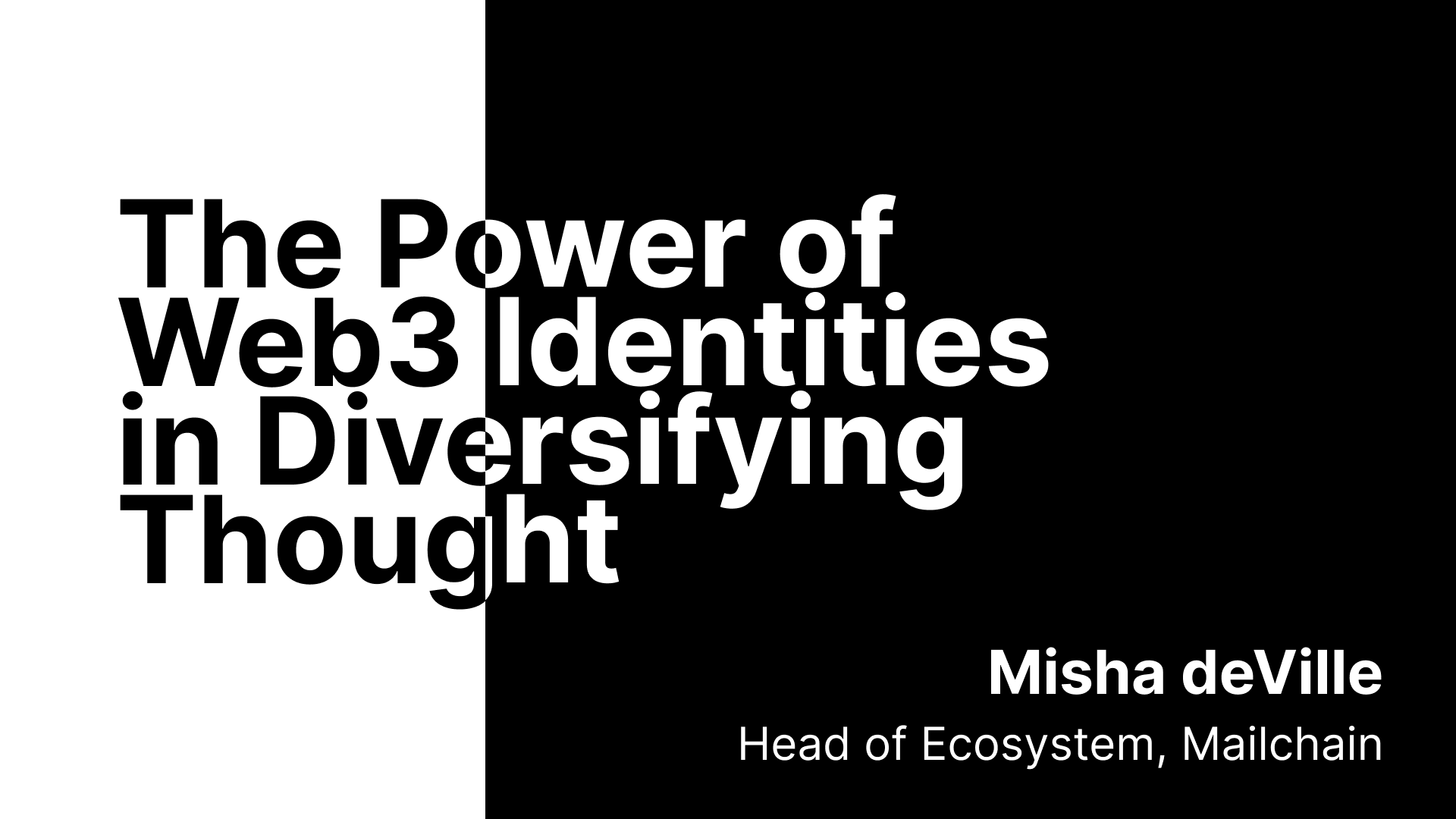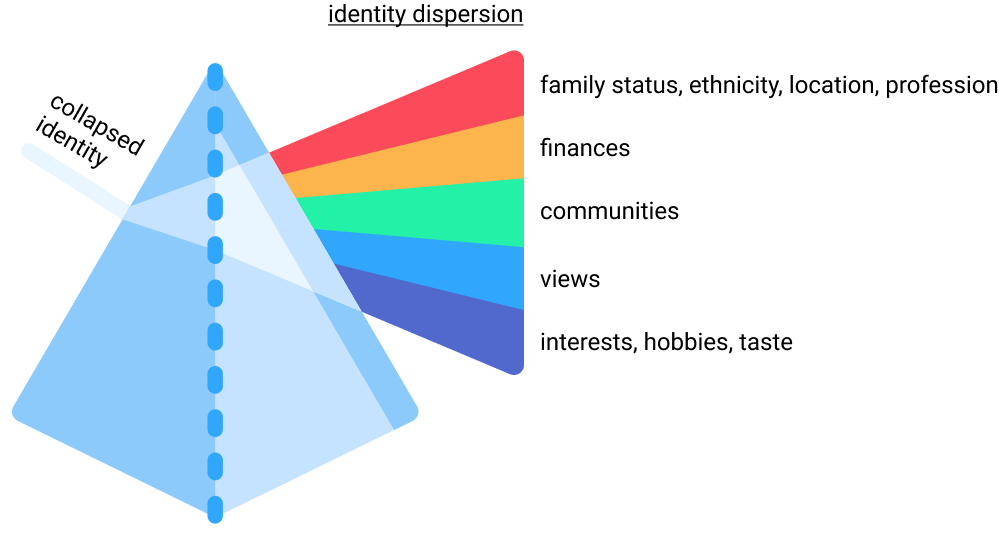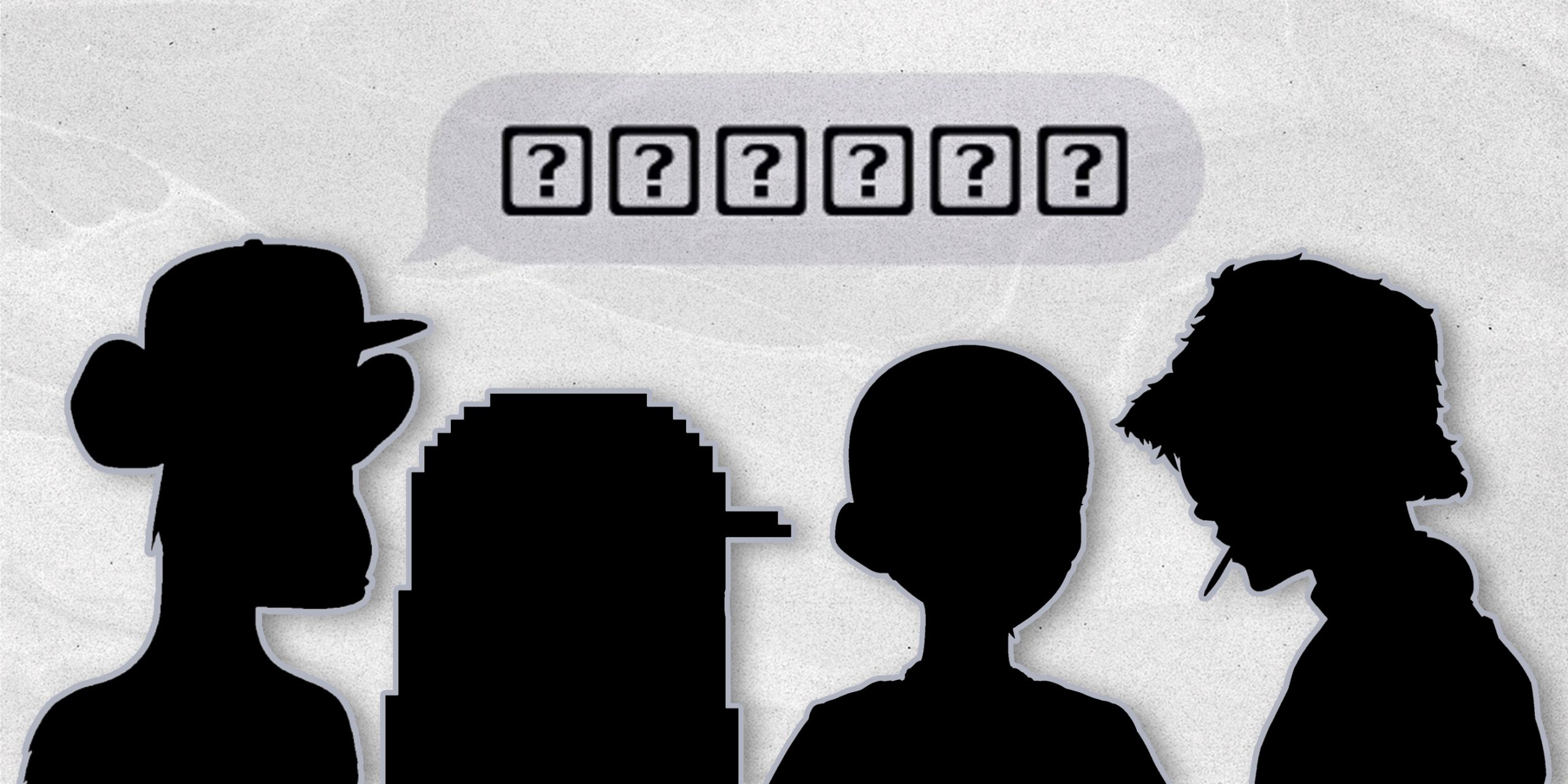
The power of web3 identities in diversifying thought
Is it our responsibility, as builders, to enable all web3 identities to participate?
A long-form version of my talk at EthCC 2023. Thoughts and opinions very welcome.

I had a meeting with a dog in a crown the other day. I’ve had meetings with food items, animals and many other hybrids that feel akin to the early MSN names or buzzfeed quizzes that would give you a rapper name based on your star sign and favourite colour. I would guess that the majority of people reading this are quite comfortable with this level of pseudonymity. I’d even ask if you noticed the last time someone took a meeting using their ENS name. Whereas if a regal dog had turned up to a meeting while I was working at AWS, I would have dismissed them immediately as a joke or a scam. In web3, however, I find myself being less aware of appearance, of the gender, background or ethnicity of the people I’m interacting with. These differentiators don’t feel as salient when someone can turn up to a meeting as a penguin.
I think that’s one of the greatest powers of web3 identity. Personally I’m not interested in the trading value of the name or the avatar, for me the value is in the ability for web3 identities to remove the conscious and unconscious biases that we inflict upon ourselves and upon others every day.

Pseudonymity, the act of concealing degrees of information about ones identity, is no new thing when it comes to reducing bias. The Bronte Sisters became the Bell Brothers and Mary Evans became George Eliot. We see many artists using pseudonyms, avatars or masks like The Gorillaz, DaftPunk, Sia, in fact Childish Gambino did famously use a rap name generator. Pseudonyms often enable an alter ego that can take actions that ones ‘core’ self cannot; perhaps out of fear of public conflict or even inner constraint. Benjamin Franklin for example, used female pseudonyms when writing satire or more feminist pieces, and then there are artists like Banksy who we may never know the full identity of.
Pseudonymity is a continuum, covering degrees from totally anonymous to thoroughly named. The public narrative has taught us to fear and mistrust those who hide parts of their identity online. But while there is merit to the arguments against pseudonymity, with the direction that the algorithm-led internet is heading, pseudonymous practices in the right contexts could have significant benefits for us all.

Our world systems and everyday actions have turned chronically online, and the constraints of the existing internet structures have collapsed the complexity and multiplicity of our identities. Our experiences, our opinions and history have been forcefully linked together by the ‘real-name web’, and we continue to proliferate the effects forsake of single sign on and access to social tools…dare I mention the data permissions for Threads.
There are positives to this convenience and ease, there are also contexts where it’s imperative to require legal names, but I fear the aggregation of all parts of our lives into a single digital profile is narrowing our exposure to diverse thought and limiting our sense of self and self-expression. I believe it is driving the growing trend towards a binary world view. This tendency to see things in terms of absolutes. If a person is X then they can’t be Y. If they worked at this company, or came from that background, they don’t have the ‘right’ to hold that opinion.
The ‘optimising’ nature of our digital feeds is tunneling our vision and moulding us into the single predictable ‘data type’ we’ve been assigned. You may not even realise it’s happening, but have you ever looked over someone’s shoulder whilst they’ve been scrolling and realised their feed is feeding them a different algorithm. That the view from their window doesn’t look like yours.
Identity is not meant to be one thing, it is many. It shifts within the contextual bounds we find ourselves in. But online the contextual boundedness of identity construction is often collapsed. We have to present ourselves to our whole network all at once. Often having to simplify and remove nuance from our opinions to appeal to the masses. I know I’ve chosen not to voice opinions at all before because my view sits in the middle of the extremes and I fear being misunderstood and attacked on both sides. These biases exist because of how we are socialised and they differ for everyone. You only have to look at the countless studies of self-fulfilling prophecy and stereotype threat to realise how powerful the effects are.
The more nuances and diversity of thought are diminished, the more binary oppositions can take over. The effects of this are far reaching, from rises in cancel culture to political extremists appealing to polarised tribes. But for me, and for many of us in this space, I believe the greatest risks are in us building tools that multiply these effects rather than help to diminish them. There are so many negative biases we can’t escape in our real-world and we will continue to build practices to reduce these; but I do have to question, why bring these into the virtual world if we don’t have to?

The AI hysteria of today continues to strengthen the argument that technology is meant to broaden our possibilities and extend our capabilities. It is not meant to control, constrict, or narrow our humanity.
So where Web2 collapses our identity, Web3 brings the potential for identity dispersion. A term originating from Peter Burke’s Identity theory, it has been expanded in a web3 context to describe the ability for individuals to control the creation, separation, and unification of their multiple online selves.
In web3, you can have full ownership over your digital assets and digital identity. You get to determine what information is shared, with whom, and under what circumstances. It empowers users to shape their digital representation in each context, protect their privacy, and safeguard their personal data from unauthorised access or misuse. For example, if I want to put myself forwards as a delegate for governance decisions, then I would want you to know about my job experiences and certifications that prove I have expertise in the given voting area. Whereas my asian heritage may be irrelevant and not something I need to share. This doesn’t make me any less proud of my heritage, it is simply acknowledging the parts of my identity that could hold prejudices for some people and choosing not to bring that into the discussion. Pseudonymity is not just about concealing information; it’s also about selectively disclosing the information that is relevant to the context.
Web3 identities have the power to remove the biases we are exposed to and the blockers to expression that we face when we engage from a singular all-exposing identity. Mounting evidence in psychotherapy has demonstrated that avatars and embodied virtual reality give individuals a greater freedom to experiment and can serve as a kind of R&D for our core identities. One study, for example, found that female participants were less sensitive to the effects of stereotype threat when embodying a male compared to a female avatar. I even heard someone at EthCC say that they use a 'burner twitter' to discuss field-related topics online so as not to influence the discussion with their place of work.
Now imagine taking that concept further in a web3 context, where you can have multiple identities from which you experience the world, and each is served different algorithms and can explore different ideas and test different opinions, but all the while maintaining fine grained control over your data and being able to securely prove the baselines needed for a good user experience, like proof that you’re human.

To me, this capacity for identity dispersion and contextual pseudonymity, matters not just for the sake of privacy and reducing cancel culture, but because it has the power to enable genuine diversity of thought – both in what we are exposed to and what we produce. Diversity of thought in this context refers simply to the reality that there is a multitude of ways to think about something. Which sounds obvious but many of our systems and biases prevent it.
You need to involve people from all walks of life to get a genuinely deep understanding of the problem you’re trying to solve. And those closest to the problem should also be those closest to the solution. We need to stop designing top down technology. When everyone holds different biases, we cannot assume to understand the lived experience of everyone and therefore we cannot assume to know what personal data everyone is comfortable sharing about themselves in a given context. It is very difficult to give everyone this type of identity flexibility in both the real world and the real-name web. But in Web3 we have the tools to do so. We can enable people to remove the internal and external biases that are irrelevant to a given interaction or discussion.
Much of the promise of Web3 is that it will create a ‘fairer internet’. But without diversity of thought we will continue to see our applications built in ways that prolong the existing biased and constrictive systems. We need to use tools that support self-sovereign identity and DIDs, such as SIWE, ENS, Spruce, with verifiable credentials from Disco and CyberConnect. Or governance tools, like Snapshot, which can let people vote based on their contribution to the community, not because of where they came from or how old they are. We are so early in building this internet. We have so much opportunity to create alternative systems that bring diversity of thought into the actual structures that future applications will be built upon.

I know you may be thinking you’ve heard this before. Web2 held a similar promise. The internet already dissolves physical borders and lets us access global opinions, so why is this any different? I argue that the timing to rebuild the internet in a way that better serves everyone as humans has never been more important or more possible.
If we look to the realm of privacy, the digital order is becoming ever more powerful. The mass of data tied to single individual combined with advancements in AI and quantum computing, gives unprecedented power to the technology companies. And the AI models are being trained on binary, polarised data sets, stripped of real world human complexity. Feel free to contest, but the echo chambers of Twitter sound nothing like any town square I’ve ever been in.
If we look to the world economy, more business is now taking place online than offline. The pandemic accelerated a movement to virtual working and the tools to make this possible. So if more economic activity and interactions are happening virtually, why not choose to remove the biases that we cannot remove in the real world?
I do not mean all interactions should take place online. I am the first person to encourage real-world experiences; but, if so much is already online then perhaps we have an opportunity to build alternative systems that do not necessarily go against our existing systems but go around them. Alternative systems that bring greater diversity of thought by abstracting away the biases from these interactions altogether.
We need more public representation of diversity but we also need to give people the ability to express their individual thought without self-inflicted or external biases. It is never one or the other. Real names, pseudonyms and anonymity all have their time and place. The strength as I see it, is in building an internet that gives everyone the opportunity to choose how they show up and participate in each given context.

Creating this type of environment is hard. Where do you draw the line for the level of anonymity you permit your users? What information do you actually need to make your product usable? And how can you design your platform in a way that empower your users with the greatest ownership of their identity?
There are advantages and disadvantages at all parts of the spectrum. And so it is so important to contextualise discussions of identity. For some, the baseline may just be a proof of humanity. They don’t need to know which country you were born in or what gender you were born as, simply that you hold the rights of a human. Others may need privacy preserving KYC or KYB through tools like Quadrata. Still others may just need to know you hold a membership token.
As a first step, I believe we need to rebuild the basic tools that underpin the majority of web apps in a way that enables these levels of flexibility. Tools for authentication, transactions, and communication. Tools we use every day that enable the digital economy. With email for example, our inboxes read like a diary; where we’ve been, what we’ve bought, who we’re working with, so we need to be able to own that data and own the communication for all the identities we choose to use across the internet without publicly linking those identities together. If we login with wallet we don’t want to lose the functionality that an email identifier provides in web2. We want to login with wallet and still receive communication to that identity privately and in context.

When we talk of democratising opportunity and designing a fairer internet, I think we should consider how we can bring the complexity of humanity and diversity of thought into our systems. Because a lack of diversity anywhere creates weakness. Look at monocropping; the decline of biodiversity in natural ecosystems lowers the entire ecosystems productivity, quality and ability to defend itself.
And yes it’s messier. You can’t fit everyone into neat grids, but we as humans are messy. We are complex. And it’s about time we let that complexity into our digital lives and interactions. Let diversity of thought fill the gaps between the polarisations.
So as builders and advocates of the new internet, I believe it’s not our place to dictate who or how people show up and contribute, but it is our responsibility to give them the choice.

We are used to the real-name web. We have learned to tie all of our data together.
But I would like to leave you with one question, who does that serve?
Resources and Further Reading
Elif Shafak: The Revolutionary Power of Diverse Thought [video]
Balaji: Pseudonymous Economy [video]
Ian Bremmer: The Next Global Superpower Isn't Who You Think [video]
p.s. I have more recommendations for further reading on this topic so please feel free to reach out to me if it's of interest. And if you have any suggestions please comment them below!





